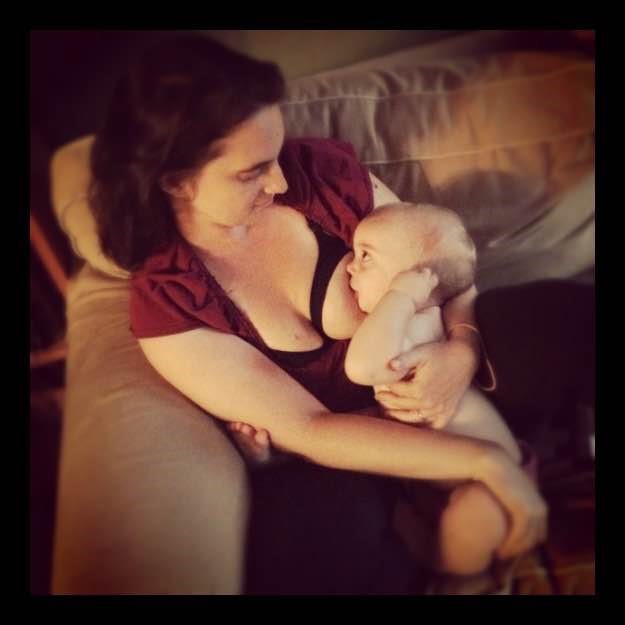By Wendy Wisner, IBCLC
Every mom has different goals for breastfeeding. As an IBCLC, I always strive to support each mom in her specific nursing goals, whether she wants to nurse for just a few months or many more. Each mom’s life situation is different, nuanced, and complicated. As much as I know the powerful benefits of nursing a child to 12 months and beyond, I would never tell a mother she should do so if it is not something she wishes to do, or if she feels that her life circumstances don’t warrant it.
This post is not for a mom who hopes to wean after a few weeks or months of nursing. This is for a mom who would like to nurse for many months, maybe up to a year, maybe way beyond. This is for the mom who doesn’t have a specific “nursing goal” in mind (who really does, at the beginning, right?), but has at least some vague notion that she would like to continue nursing for some months ahead, or wherever it takes her and her baby.
I offer you two pieces of advice:
- Let your breasts become a place of comfort as well as a place of nourishment.
- Don’t break the nurse/sleep association too soon.
I often hear from mothers whose babies seem to be weaning. Usually, these babies are reacting to a certain stressor (teething, illness, stress in the family), and are simply having a nursing strike. With a little time, patience, and lots of tricks of the trade, the strike resolves (here is a great link about nursing strikes).
But just as often, I hear from moms of babies who seem to be weaning on their own, well before the mother is ready. These babies have dropped nursing sessions one by one, at an earlier age than babies normally wean on their own. (There is some debate about what a true self-weaning age is, and there is a lot of natural variation. But in my experience, and in the experience of other experts, toddlers don’t wean on their own before the age of 2 or 3.)
Many mothers, without realizing it, are speeding along the process of weaning, or disinterest in the breast, simply by removing the “comfort nursing” and sleep associations of breastfeeding.
I have written this before and I will say it again: breastfeeding is not just a feeding method. It’s comfort. It’s love. And babies know this best. A baby who does not find comfort in breastfeeding will find it elsewhere, and as solids and other drinks are introduced, breastfeeding can easily fall by the wayside if it is viewed just as a feeding method.
Here’s how this might happen. Starting at about 3-4 months, it is common for babies to become very distracted little beings. Suddenly there’s a whole world out there, and during their waking hours, babies want to explore it! They can become very distracted nursers, and will only nurse well during their sleepy times. They will only come to the breast for comfort nursing. They no longer want to sit still at “mealtimes.” They nurse well when they are tired, and nurse to sleep, in the middle of sleep, and just as they wake up. Of course, babies aren’t like this all of the time, but from 4-12 months, this type of nursing fussiness is very common. Add in all the other stuff that might happen during a baby’s first year of life—teething, separation anxiety, busy family life, mothers returning to work, developmental milestones—and you have a recipe for weaning, especially if a mother has removed comfort nursing and sleepytime nursing from the mix.
New mothers are often told that breastfeeding as a soothing method is “bad” or “sets up bad habits.” They are bombarded with this advice from family, friends, and, unfortunately, many pediatricians.
First, there’s the “human pacifier” idea. Many mothers are concerned that they will become a “human pacifier” (this is a great piece on the problems with that term) and that it’s important for them to disconnect nursing from comforting. (In terms of actual pacifier use, I know that some mothers find them useful. They can be fine if used moderately, and not to replace too much of the normal comfort nursing that babies seek.)
Mothers are also very concerned about making sure their babies “self-soothe” and fall asleep on their own and will stop nursing to sleep at an early age (this is a post I wrote about why it’s ok to nurse your baby to sleep). Some mothers will stop nursing their babies in the middle of the night by 4-6 months, or sometime in the first year, as per guidance from a book or their pediatrician. (It’s important to note that nightweaning at 4-6 months, or even a few months later, has the added possible danger of decreasing your overall milk supply.)
Many of these mothers simply don’t know the consequences of training their babies out of comfort and sleep nursing. At the beginning of breastfeeding, it is understandable that mothers are just thinking of their breasts as feeding tools and nursing times as mealtimes. But babies don’t, even when they are very young. They are certainly relying on breastfeeding as nourishment, but eating is always an exchange of love for them, as they inhale their mothers’ smell, listen to her voice, and are wrapped in her warm arms. It is sad—and concerning—that mothers are being told to ignore this vital part of breastfeeding.
As you enter the toddler years of nursing, nursing becomes much more clearly linked with soothing. Of course, breastmilk past 12 months is still full of nutrition, antibodies, and everything amazing. In fact, if you nurse your toddler a few times a day, you don’t need to offer other animal milks. Mama milk is all the “milk” your toddler needs. But your toddler isn’t necessarily going to sit down for a “milk meal.” Your toddler is going to nurse when he or she needs some extra reassurance, a little break from playing, a need to reconnect, etc. And certainly, most of toddler nursing happens at naptime and nighttime. These are often the longest sessions, and is when your toddler gets the most milk!
None of this is to say that setting limits with your toddler isn’t natural and normal—it most certainly is—but that if you want to continue, you will need to accept that as time goes on, this is what nursing is all about. Many mothers of toddlers gently wean from middle-of-the-night nursing, for example, and still go on to nurse for as long as they want.
As you get to the end of a nursing relationship—whether you want to push things along a bit, or just let it happen—you will probably just be down to nursing to sleep or right before bed. Usually these are the last sessions to go. It’s quite amazing to watch these go on their own, and to see your child learn other ways of soothing. Trust me: it does happen, on its own, in due time, but that’s another post unto itself!
So snuggle up with your nursling, remember that you are the expert on your child, and nurse on!
 Wendy Wisner is a mom, writer, and lactation consultant (IBCLC). She is the author of two books of poems (CW Books), and her writing has appeared in such publications as Huffington Post, Brain, Child Magazine, Scary Mommy, and Mamalode. She lives in New York with her husband and two sons. She does all her writing on her phone while she lies in the dark waiting for her kids to fall asleep. Find Wendy at www.wendywisner.com. Follow her on Facebook and Twitter.
Wendy Wisner is a mom, writer, and lactation consultant (IBCLC). She is the author of two books of poems (CW Books), and her writing has appeared in such publications as Huffington Post, Brain, Child Magazine, Scary Mommy, and Mamalode. She lives in New York with her husband and two sons. She does all her writing on her phone while she lies in the dark waiting for her kids to fall asleep. Find Wendy at www.wendywisner.com. Follow her on Facebook and Twitter.













